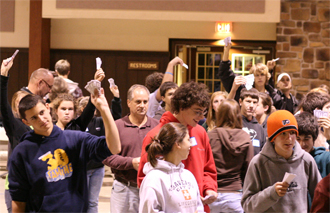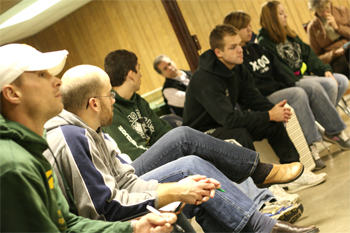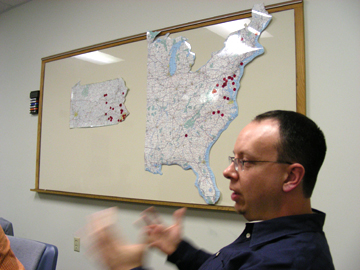Stephen Kriss skriss@mosaicmennonites.org
 After decades of partnership, both formal and informal, Andover (Vt.) Community Church and Franconia Mennonite Conference have disengaged. Most recently, the Andover congregation had been considered a Partner in Mission through the credentialing of the congregation’s pastors, Dan and Christine Chapman. After the termination of the Chapman’s leadership of the congregation and upon further consultation, the relationship effectively ended in November of 2007.
After decades of partnership, both formal and informal, Andover (Vt.) Community Church and Franconia Mennonite Conference have disengaged. Most recently, the Andover congregation had been considered a Partner in Mission through the credentialing of the congregation’s pastors, Dan and Christine Chapman. After the termination of the Chapman’s leadership of the congregation and upon further consultation, the relationship effectively ended in November of 2007.
Andover’s historic ties to Franconia Conference go back to its beginning as families with connections to conference congregations in Pennsylvania settled in Vermont in the 1960s. In recent years, the relationship had become more tenuous. Now, suggesting that the direction of the Mennonite Church USA was not in alignment with the congregation’s future, congregational members have sought to distance themselves further from the larger bodies that include the conference and the denomination. According to Donella M. Clemens, who serves as Franconia Conference’s liaison to congregations and ministries in Vermont, “In the seven years that I have related to the group at Andover we have enjoyed times of wonderful fellowship together. We wish them the grace and blessing of God as they tell of the good news of Jesus Christ through their congregational life and worship and in their witness to the Andover community.”
Franconia Conference ministries continue in Vermont with the Bethany (Bridgewater Corrners) and Taftsville congregations, Bethany Birches Camp and an emerging congregation in the Gass area.
“While it’s always sad and difficult to see a congregation move in a different direction,” says Franconia Conference Executive Minister Noel Santiago, “We recognize that they are pursuing what is God’s call to them at this point in time. Into the future, we are committed to deepening partnerships and ministries in Vermont. We celebrate the many persons have been faithful throughout the years in the work of Andover Community Church and we are grateful to God and each one.”

 Jennifer Landis of Souderton has begun a four-year term as a board member of Mennonite Mutual Aid (MMA).
Jennifer Landis of Souderton has begun a four-year term as a board member of Mennonite Mutual Aid (MMA). Franconia and
Franconia and  Sixth- and seventh-graders should bring a snack; eight-graders are asked to bring a bring a two-liter bottle of soda or other drink. Coordinators are also asking that each youth bring children’s vitamins to donate to the MAMA Project in Honduras.
Sixth- and seventh-graders should bring a snack; eight-graders are asked to bring a bring a two-liter bottle of soda or other drink. Coordinators are also asking that each youth bring children’s vitamins to donate to the MAMA Project in Honduras.
 Youth, sponsors, and pastors from 15 area congregations gathered recently for the annual Youth Leadership Retreat at
Youth, sponsors, and pastors from 15 area congregations gathered recently for the annual Youth Leadership Retreat at  Curt opened the gathering with a call to create an intentional community for the time spent at Spruce Lake. He acknowledged that youth, with their curiosity and tough questions, have the ability to challenge adults to recommit to their faith. During the weekend, Curt used a spiritual type tool published by the Alban Institute entitled “Discover Your Spiritual Type.” It was followed by a case study that revolved around challenging leadership decisions in congregations. The case study involved discerning a request from
Curt opened the gathering with a call to create an intentional community for the time spent at Spruce Lake. He acknowledged that youth, with their curiosity and tough questions, have the ability to challenge adults to recommit to their faith. During the weekend, Curt used a spiritual type tool published by the Alban Institute entitled “Discover Your Spiritual Type.” It was followed by a case study that revolved around challenging leadership decisions in congregations. The case study involved discerning a request from  Emma, Kate, and Brittany attended two workshops together. They said the workshops were relevant, more interesting than anticipated, and that they had been challenged to think differently about the issues addressed in each session.
Emma, Kate, and Brittany attended two workshops together. They said the workshops were relevant, more interesting than anticipated, and that they had been challenged to think differently about the issues addressed in each session.
 “I think it would motivate all of us to see what is already happening in numerous locations across our region,” said Tyson, and he was right. To the amazement of the participants, the dots accumulated as each conference shared its list. When everyone had finished, forty-seven dots, spanning from Maine to Georgia, covered the map. Conference leaders noted that many of these church plants are led by racial/ethnic Mennonites. They also openly acknowledge that these new church initiatives have emerged organically, without strategic planning, studies, or heavy financial investments, but clearly as the movement of God.
“I think it would motivate all of us to see what is already happening in numerous locations across our region,” said Tyson, and he was right. To the amazement of the participants, the dots accumulated as each conference shared its list. When everyone had finished, forty-seven dots, spanning from Maine to Georgia, covered the map. Conference leaders noted that many of these church plants are led by racial/ethnic Mennonites. They also openly acknowledge that these new church initiatives have emerged organically, without strategic planning, studies, or heavy financial investments, but clearly as the movement of God.